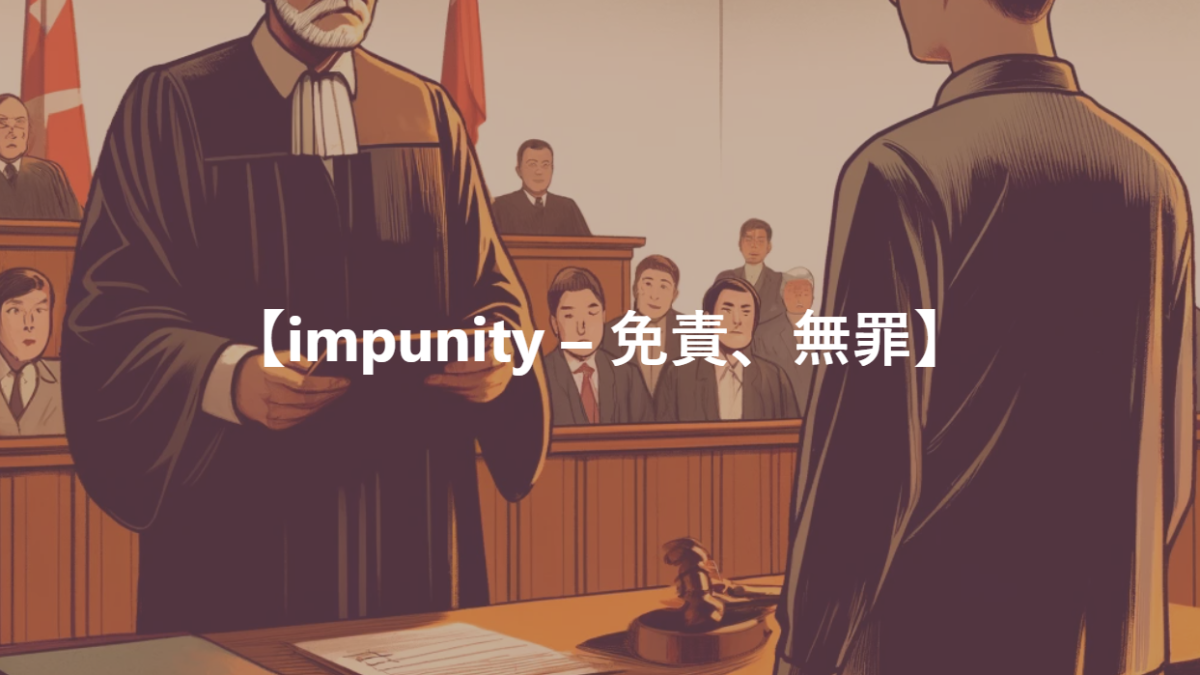語源・類義語・反対語・例文
【impunity – 免責、無罪】という単語の語源とか由来を知っていますか?
「Impunity」はラテン語の「impunitas」から来ています。これは、「impunis」に由来し、「罰せられない」という意味です。さらに細かく分解すると、「in-」(非、無)と「poena」(罰、刑罰)という単語に分けられます。「In-」は否定を意味し、「poena」は罰や刑罰を意味するため、合わせて「罰せられない」または「罰からの免除」という意味になります。
この語源は、誰かが行動の結果として法的な罰や責任から自由である状態、つまり罪を犯しても罰を受けない状態を表現するのに用います。英語においては、主に法的な文脈や道徳的な議論で使われることが多く、特に法の下での免責や、ある行為に対して何らかの罰や責任を負わない状況を指すのに使用されます。
「Impunity」は、法律や正義に関する議論では重要な概念であり、特に犯罪や不正行為が罰されるべきであるという原則と対立する場合に引き合いに出されます。この単語は、しばしば人権侵害や公的機関による不正行為など、罰せられるべき行為が適切に処罰されない状況を批判する際に用いられます。
“Impunity” comes from the Latin word “impunitas,” which is derived from “impunis,” meaning “not punished.” Breaking it down further, it is composed of the words “in-” (not, without) and “poena” (punishment, penalty). Thus, “in-” signifies negation, and “poena” means punishment or penalty, collectively translating to “not punished” or “exemption from punishment.”
This origin is used to describe a state where someone is free from legal punishment or responsibility as a consequence of their actions, meaning they do not receive punishment even if they commit a crime. In English, it is primarily used in legal contexts or moral discussions, especially to refer to exemption under the law or a situation where someone does not bear any punishment or responsibility for an act.
“Impunity” is an important concept in discussions related to law and justice, particularly when contrasting with the principle that crimes or misconduct should be punished. This word is often employed to criticize situations where acts deserving of punishment, such as human rights violations or misconduct by public institutions, do not receive appropriate sanctions.
この単語の類義語・反対語を教えてください。
類義語
- Exemption – 免除: 特定の義務や規則から解放されること。
- Immunity – 免疫、免除: 法的な責任や義務から保護される状態。
- Absolution – 免罪: 罪や過ちから解放されること。
- Acquittal – 無罪判決: 裁判での罪がないとする判決。
- Indemnity – 賠償免除: 損害賠償責任からの免除。
反対語
- Punishment – 罰: 不正行為や規則違反に対する処罰。
- Conviction – 有罪判決: 犯罪の責任が認められる裁判所の判決。
- Liability – 責任: 法的な責任や義務。
- Penalty – 刑罰: 違反や犯罪に対して課される罰。
- Accountability – 説明責任: 行動や決定に対する責任。
似た単語で間違いやすい単語はありますか?
- Immunity: 「免疫」または「免除」と訳されますが、医学的な免疫(病気に対する体の抵抗力)と法的な免除(特定の法的責任からの保護)の両方の意味があります。「impunity」と混同されがちですが、「immunity」は特に法的な文脈や医学的な文脈で使用され、一方「impunity」は罰からの免除に特化した用語です。
- Impunity vs. Impunity: このペアには直接的な混同はありませんが、誤字や誤解によって「impunity」が間違って使用されることがあります。「Impunity」は正しい用語で、「罰からの免除」を意味します。
- Amnesty: 「恩赦」と訳され、特に政治犯に対する罪の赦しや、特定の行為に対して広く免責を与える法的措置を指します。「impunity」とは異なり、一般的には特定の政治的文脈や歴史的事件後に適用されることが多いです。
- Pardon: 「赦免」と訳され、個人に対する罪の免除や罰の減免を意味します。これは特定の個人に対して行われる行為であり、「impunity」がより一般的な罰からの免除を指すのに対して、「pardon」は個別のケースに適用されます。
この単語を使った例文をいくつか教えてください。
The corrupt politician was able to embezzle public funds with impunity, as there were no consequences for his actions.
(腐敗した政治家は、彼の行動に対して何の結果もなかったため、公金を横領することができました。)
The dictator ruled with impunity, suppressing any opposition and silencing dissenting voices.
(独裁者は免責のもとに支配し、反対勢力を抑圧し、異議を唱える声を沈黙させました。)
Despite overwhelming evidence of wrongdoing, the powerful business tycoon managed to escape justice with impunity.
(圧倒的な不正の証拠にもかかわらず、強力なビジネスマンは免責のもとに正義を逃れることができました。)
The serial killer operated for years, taking innocent lives with impunity, until he was finally apprehended by the authorities.
(シリアルキラーは数年間にわたり、免責のもとに無実の命を奪い続けましたが、ついに当局に逮捕されました。)
The powerful corporation violated environmental regulations with impunity, causing irreparable damage to the ecosystem.
(強力な企業は免責のもとに環境規制を破り、生態系に修復不可能な損害を与えました。)
【impunity – 免責、無罪】のコロケーション
- Act with impunity – 無罪で行動する
- このフレーズは、個人や組織が罪を犯しても罰せられることなく行動できる状況を指します。法の不備や権力の乱用により、不正行為が許される状態を表現する際に用いられます。
- Enjoy impunity – 免責を享受する
- 誰かが罪や罰から保護され、その結果として自由に行動できる状態を示します。しばしば、正義が実現されない状況や、法的な責任を回避できる特権的な立場にある人々を指して使われます。
- Grant impunity – 免責を与える
- 法律や権力を持つ者が、特定の個人や集団に対して罰からの免除を提供する行為です。この表現は、政府や司法機関などが、犯罪行為に対する責任から誰かを故意に保護する状況を指すことがあります。
- Impunity for crimes – 犯罪に対する免責
- 犯罪行為が罰せられずに済む状態を指します。特に人権侵害や重大な不正行為が、適切な法的処置なしに放置される場合に用いられます。
- Culture of impunity – 免責の文化
- 社会や組織内で、罪や違反が一般的に罰せられないという慣習や風潮を指します。このフレーズは、不正行為が常態化し、罰の恐れなく行われる環境を批判的に表現するのに使用されます。
「impunity」、つまり免責や無罪という概念は、法的、政治的、そして社会正義の議論において中心的な役割を果たします。この単語を含むコロケーションは、不正行為が罰せられずに済む状況や、法的な責任からの逃れ方を探る際に特に重要です。
まず、「Act with impunity」は、個人や集団が罰の恐れなく行動できる状況を指します。これは、法の隙間を悪用したり、権力を乱用して不正行為を行ったりすることが可能であることを示唆しています。この表現は、正義が実現されない現実を浮き彫りにします。
「Enjoy impunity」は、特定の人々が罪から自由であるという特権を享受している状態を表します。これはしばしば、社会的、経済的地位が高い人々が、法的な責任を回避する能力を持っていることを示しています。
「Grant impunity」は、権力者が意図的に犯罪行為に対する免責を提供する状況を指します。これは、政府や司法が特定の行為を見逃すことを選択した場合に生じることがあります。
「Impunity for crimes」は、犯罪行為が適切な罰を受けることなく残される状況を指し、特に重大な人権侵害や社会に対する不正行為に対して使われます。このフレーズは、法的な正義の欠如を強調し、社会的な警鐘となります。
最後に、「Culture of impunity」は、社会や組織内で罰が一般的に適用されない風潮を指します。これは不正行為が許容され、時には奨励される環境を示し、そのような文化が根付くことの危険性を警告しています。
これらのコロケーションを通じて、「impunity」の概念は、法と正義の間の複雑な関係や、社会内の権力構造を反映しています。これらの表現は、不正行為に対する罰の不在がもたらす影響について、深く考えさせるものです。
The concept of “impunity,” which encompasses the notions of exemption and innocence, plays a pivotal role in legal, political, and social justice discussions. Collocations involving this word are particularly crucial when exploring situations where misconduct goes unpunished or when navigating ways to evade legal responsibilities.
Firstly, “Act with impunity” refers to situations where individuals or groups can act without fear of punishment. This suggests the possibility of exploiting legal loopholes or abusing power to commit acts of wrongdoing. This expression highlights the grim reality where justice is not served.
“Enjoy impunity” depicts a state where certain individuals enjoy the privilege of being free from guilt. It often indicates that people of high social and economic status have the capability to dodge legal accountability.
“Grant impunity” points to scenarios where authorities intentionally provide exemption from punishment for criminal activities. This occurs when governments or judicial bodies choose to overlook specific actions.
“Impunity for crimes” refers to situations where criminal acts are left unpunished, especially in cases of severe human rights violations or societal misconduct. This phrase emphasizes the lack of legal justice and serves as a societal alarm bell.
Lastly, “Culture of impunity” indicates a tendency within societies or organizations where punishment is generally not applied. It shows an environment where misconduct is tolerated, and sometimes even encouraged, warning of the dangers of such a culture taking root.
Through these collocations, the concept of “impunity” reflects the intricate relationship between law and justice, as well as the power structures within society. These expressions provoke deep thought about the implications of the absence of punishment for wrongdoing.
impunityを使った文法問題
- The dictator ruled with _____, believing he was above the law.
- (A) impunity
- (B) impunities
- (C) impunities’
- (D) impune
解答と解説: (A) impunity
解説: “with impunity”で「何のお咎めもなしに」という意味の熟語になります。
- The corrupt officials acted with _____, confident that their actions would have no consequences.
- (A) impunity
- (B) impunities
- (C) impunities’
- (D) impune
解答と解説: (A) impunity
解説: “with impunity”で「何のお咎めもなしに」という意味の熟語になります。
- The international community condemned the regime for its human rights abuses and demanded an end to the culture of _____.
- (A) impunity
- (B) impunities
- (C) impunities’
- (D) impune
解答と解説: (A) impunity
解説: 文脈から、国際社会が非難しているのは「免責」の文化であることがわかります。impunitiesは複数形、impunities’は複数形の所有格、impuneは形容詞で、文意に合いません。
- The lack of accountability allowed the perpetrators to commit crimes with _____.
- (A) impunity
- (B) impunities
- (C) impunities’
- (D) impune
解答と解説: (A) impunity
解説: “with impunity”で「何のお咎めもなしに」という意味の熟語になります。
- The report highlighted the need to end _____ for those who violate international law.
- (A) impunity
- (B) impunities
- (C) impunities’
- (D) impune
解答と解説: (A) impunity
解説: 文脈から、報告書が強調しているのは、国際法違反者に対する「免責」を終わらせる必要性であることがわかります。impunitiesは複数形、impunities’は複数形の所有格、impuneは形容詞で、文意に合いません。

